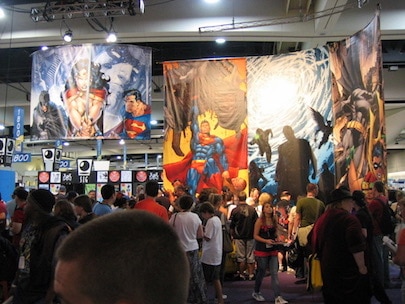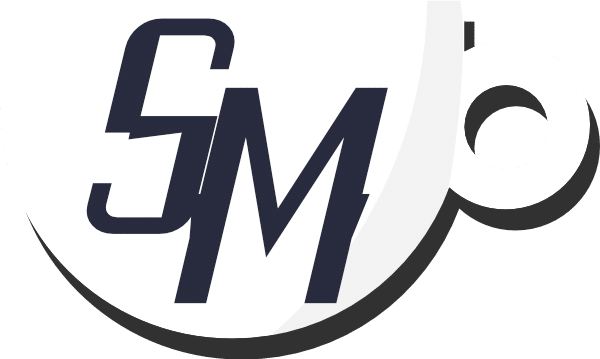
The question I get asked the most (other than, “Are you British?” and “Do you draw the pictures too?”) is easily, “How do I break in?” (and by that they mean “into the comic industry”, not “into some old pensioner’s home”). I was lucky enough to receive some great advice from some very helpful pros years ago (Warren Ellis, Phil Jiminez and Ashley Wood, take a bow) and wanted to pass on the gesture by talking about breaking in from my perspective; namely as a foreign writer. Read on with the understanding that this is all just from my point of view, it’s based on what worked for me and that I offer no guarantees that any of this will ‘get you in’, ‘get you famous’ or ‘get you laid’ (the last one will make more sense later…or not).
WHAT I DID, THE SHORT STORY
Here’s the super short version of what I did to get into the industry.
I researched by reading articles and by emailing helpful, established professionals. I flew to America and attended the San Diego Con. I made contacts. I developed those contacts via email and phone. I attended the San Diego Con several years running and made more contacts. I sold my first story (Batman LOTDK).
That’s a short and soulless account (if you’re ever with me in a bar ask for the longer version and you’ll be laughing at my mistakes) but you get the drift. It took years and it took hard work, I went through a lot and here’s the advice I can give you from the experiences I had. However this will all be focusing on breaking in via conventions because that’s the only way I know (there are other ways, I just haven’t experienced them).
IT’S A JOB INTERVIEW…REALLY
This part is really simple. It’s two words. You’ve heard it before but you’d be amazed at how many people f$#* this one up…royally. Here it is: Be professional.
By that I mean scrub up. Wash, do your hair and dress in neat, clean clothing. Fact of life: First impressions mean a lot. You don’t have to try and steal Tony Lee’s gig and wear a vest everywhere (he is indeed a dapper man) but you do need to look like you’re capable of decent personal hygiene.
Also, and this is REALLY important, more important than Tony’s vests, BE POLITE. Be polite, be respectful and understand that when you’re talking shop with an editor you’re effectively at a job interview. Being lucky enough to get an editor’s ear is the equivalent of having made it all the way through Survivor (All Stars) and facing the Jury. You’ve got those precious moments to convince them you’re worth that million dollar prize. Working in comics isn’t a million dollar prize but, man, it sure feels like it is.
WHY IT’S HARDER FOR WRITERS AND WHY ARTISTS ARE EVIL
Artists, I hate you. No I don’t. But I do (I actually don’t). Breaking in for artists is a lot easier than for writers. Does that mean it’s easy for them? Hell no. But it’s definitely easier. Artists have the ability to show their work to an editor and they might actually look at it. They’ll take the time, check it out and know whether or not it’s to their liking rather quickly. You try and hand an editor a script at a convention and watch how quickly they try to kill you with the closest stabbing instrument (nothing more embarrassing being carted out of a convention with an eight year old’s toy unicorn sticking out of your chest).
That’s why, the way I see it, writers aren’t selling scripts, they’re selling themselves and their point of view.
WHY EDITORS ARE THE BEST LOOKING WOMEN IN THE BAR
Here’s the deal, how often do you think an editor gets approached by a would be professional at a convention? How often? Ok, now times that by ten and you’re getting close. The first thing you realise when you hang out with editors at conventions is they’re stressed and you’d never want to be one. The second thing you realise is they’re beautiful, wonderful people and VERY attractive (just in case they’re reading). The third thing you realise is they spend their WHOLE day fielding submissions and queries from people trying to break in. It’s ASTOUNDING. Right when you think someone’s just wanting to chat to them it suddenly takes a turn and, uh oh, yep, they’re wanting to break in. So before long, editors learn to become immune to it, they’re tricky bastards, like the Terminator they’re programmed to adapt and overcome.
So basically you need to see editors as the best looking girl in the bar.
All night they’re sitting at the bar and every single guy is hitting on them. EVERY guy. Just when they think someone’s interested in what they have to say the guy’s eyes slowly drop to the cleavage and, yep, he’s just like all the rest. So how do you get the best looking girl in the bar? Like I’d know, I’m single! But how do you do it when it comes to editors? Be polite, be different, be you and don’t try and get married to the girl in the first thirty seconds.
When you’re talking to an editor the best way to show you’re professional and worth hiring is by not getting in their way too much. Be a normal person, ask them how they’re doing, understand they’re human and not just a gateway for your career and see if there’s any opportunities to be able to talk with them further. Email is the best. If you get their email and let them know you’ll be contacting them that’s enough. You’re starting a relationship but you’re not trying to get laid on the first date. If you walk away with ‘her’ phone number you’re on a roll. Now get the hell out of there before you stink up the place.
PLAY THE LONG GAME
As a writer you’re never going to get an editor to read one of your scripts right out of the gate. If you’ve got published work that’s definitely easier but when I started I didn’t have any work published anywhere. What you need to do is play the long game. You need to build relationships within the industry and get people to know you’re there and you’re not going away. You don’t want to be a pest but you do want to stand out from the crowd in a way that says, “I’m determined, I’m in this for the long haul.”
My advice would be to email editors, get to know them a little and let them know you’re interested in being hired but you understand it’s not going to happen right away (hey, it might, who knows). Then you’ll want to hit the cons and put a face to the name. Email them before you go, let them know you’ll be there, buy them a beer. For me I could only afford to attend one con a year and so San Diego was the choice. So I had to play the LONG game. I was lucky in that I stood out with the accent but you’ll definitely stick in their minds if you’re a nice, polite and professional person.
YOU’RE NOT SELLING AN IDEA, YOU’RE SELLING A POINT OF VIEW
This goes back to the idea that writers are selling themselves when they’re looking to be hired. You’ve all heard it before, give five different writers the same idea and they’ll produce five different stories. However you want to look beyond that to the real meat. Ideas are easy and execution is everything right? Yes. So when you’re being hired editors aren’t necessarily interested in that one idea you have, they’re interested in how you see the world, what you have to offer and what your unique point of view happens to be.
The best writers stand out because of their point of view. Their work is defined by how they see the world around them. When you talk to an editor everything you say reflects how you view your world and what you might have to offer them as a writer. On my first trip to America I was lucky enough to talk to an editor for two hours without knowing who he was. We talked about life, the world, everything. Years later we’d be talking about that meeting and he pointed out to me that the most interesting thing about me was my point of view. He listened to what I had to say and from that was curious to see what I had to say through my stories.
I’m not saying talk an editor’s ear off about bullshit and you’ll be hired. What I’m saying is that, at least in my mind, a writer is a whole package. When you open your mouth you’re saying a lot about yourself and a lot about your work. Keep that in mind.
BE PREPARED
Have ideas ready. If you know the editors you’re going to talk to (and you bloody well should) then have some ideas ready to pitch. Chances are they’re not going to want to hear them (and don’t try pushing them if the window isn’t there) but can you imagine how mortified you’d be if they asked for an idea and you didn’t have any? Single sentence, high concept pitches. Boil your ideas right down to a sentence to draw them in and have them asking for more.
LISTEN, LISTEN, LISTEN
You don’t know everything. In fact, scratch that, you don’t know anything. When you’re talking to an editor and you’re looking to be hired, listen. I was lucky enough to have one of the best editors in the industry as my first editor and I learned very quickly to listen to everything he had to say. Listen and learn. They know what they’re saying and if they’re taking the time to say it then you should take the time to listen.
SAN DIEGO, THE LAND OF OPPORTUNITY?
San Diego worked for me but, to be honest, if I was trying to break in now I’d steer clear of it. It’s become something of a monster these days and you’re not going to get the same opportunities to talk with editors that you used to. If I was trying to break in now I’d be hitting NYCC or perhaps the Emerald City Con. If you’re in America, hey no worries, hit the smaller ones and hit a few. If you’re flying from overseas then you’ll want to hit the bigger ones to have a chance to meet more editors. San Diego used to be perfect but now surviving it is one of the twelve tasks of Heracles.
THE MOST IMPORTANT THING YOU’LL EVER HEAR
Don’t give up. Ever. Do you want to do this? Do you want to do this more than anything else? Would you sacrifice a hell of a lot to get it? If the answer isn’t a resounding yes then do us all a favor and bugger off. Really, you’re making it harder for everyone else.
Working in comics and seeing my work on shelves and having it read by an audience is one of the most incredible experiences of my life. It was a life goal to be able to work in comics and I sacrificed a lot to get here. My friends and family know what I went through and it was a long, arduous journey. Was it worth it? YES. But you have to be ready to withstand some real disappointment and rejection before you get to where you want to be. People will literally tell you to your face to give up, they’ll tell you you can’t make it and that you should get a real job. Your response to that needs to be simple. You need to be able to keep on trying, improving, working on your skills and your craft and to keep bashing away at that door until they let you in.
Working in comics really isn’t a million dollar prize but, I promise you, it bloody feels like it.

